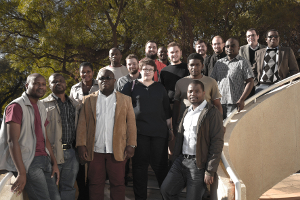Latest News Archive
Please select Category, Year, and then Month to display items
09 December 2020
|
Story UFS entral academic advising team
|
Photo Pixabay

It wasn’t easy, but we all got to this point because we stayed calm and made the effort to learn on even when it was difficult.
The University of the Free State (UFS) has remained committed to supporting you in every way possible, and as you prepare for the final assessments, remember to access the support tools you will need in order to successfully complete the 2020 academic year: https://www.ufs.ac.za/toolsforsuccess
Main exams are running from 30 November to 19 December 2020
All of the best, and break a pen in your upcoming final assessments. For those of you who will be graduating, we cannot wait to see you in that graduation attire; and those who still have some way to go, we cannot wait to serve you again in 2021 as we continue the pursuit of academic success!
Below are five main study tips that you can use for final assessment success:
1. Set a realistic study schedule
You might think that studying for eight hours straight for four days before the exam, will help you get through the work in time. See final edition of the #UFSLearnOn for more information.
2. Structure and organise your work
If your notes are organised, it is also easier for your brain to recall information, even when you become nervous during exams.
3. Practise with an old exam/semester test paper
Practice makes perfect, and although the final assessments might look different in how they are administered, it will still help to practise using old tests and exams.
4. Adapt your strategies to the content
What works for one module or even one learning outcome, might not be effective for another. You need to continually adapt your note-taking and study approaches. See #UFSLearnOn final edition for different study methods.
5. Healthy body, healthy mind
Your brain needs optimal care to perform at its best, and getting physically active (even if it is by jumping in one spot if space is limited) forces your body to release neurotransmitters responsible for positive emotions, which assist in retaining information in your memory …
Download the final edition of #UFSLearnOn that points you towards the resources you’ll need to ace your final assessments and end 2020 off on a high note!
UFS International Studies Group makes history come alive globally
2015-07-15

The UFS International Studies Group comprises students who are top achievers drawn from South Africa, Southern and Central Africa and even further afield.
Photo: Charl Devenish |
Headed by Prof Ian Phimister, the UFS International Studies Group comprises six master’s, twelve PhD and twelve postdoctoral fellows who concentrate their research endeavours on African, Imperial and Global History. All of these students are top achievers drawn from South Africa, Southern and Central Africa and even further afield. This group, now only in its third year, presents a phenomenal research output with an international reach.
In the course of the past year alone, five PhD students secured fully-funded invitations to conferences and research seminars in South Africa, Britain, as well as the Netherlands. Our researchers have been publishing articles globally and securing visiting fellowships and research awards.
Dr Clement Masakure and Dr Rosa Williams won funding to present papers at the International Network for the History of Hospitals. Tinashe Nyamunda won a prestigious three-month Cadbury Fellowship at the University of Birmingham in the United Kingdom. Anusa Daimon has been selected as a 2015 Harry Guggenheim award winner, which covers workshop attendance in Nairobi, Kenya.
From among the group, twelve articles have been published or accepted for publication in refereed scholarly journals, as well as four chapters in edited books. Book reviews written by these highly-motivated graduate students, have appeared or will appear in leading national and international academic journals. Remarkably, seven book reviews appearing in one particular issue of African Studies Review, were written by this group. Four scholarly monographs have recently been published, or soon will be. One PhD student is the joint editor (with a senior Canadian academic) of a forthcoming study on Zimbabwe’s controversial Marange diamond mining industry.
Another outstanding researcher, Dr Lindie Koorts, won the award for the best debut writer at the 2014 Woordfees for her book ‘DF Malan and the Rise of Afrikaner Nationalism’ – the first non-fiction writer to achieve this. Her book now appears on the longlist for the 2015 Alan Paton Award.